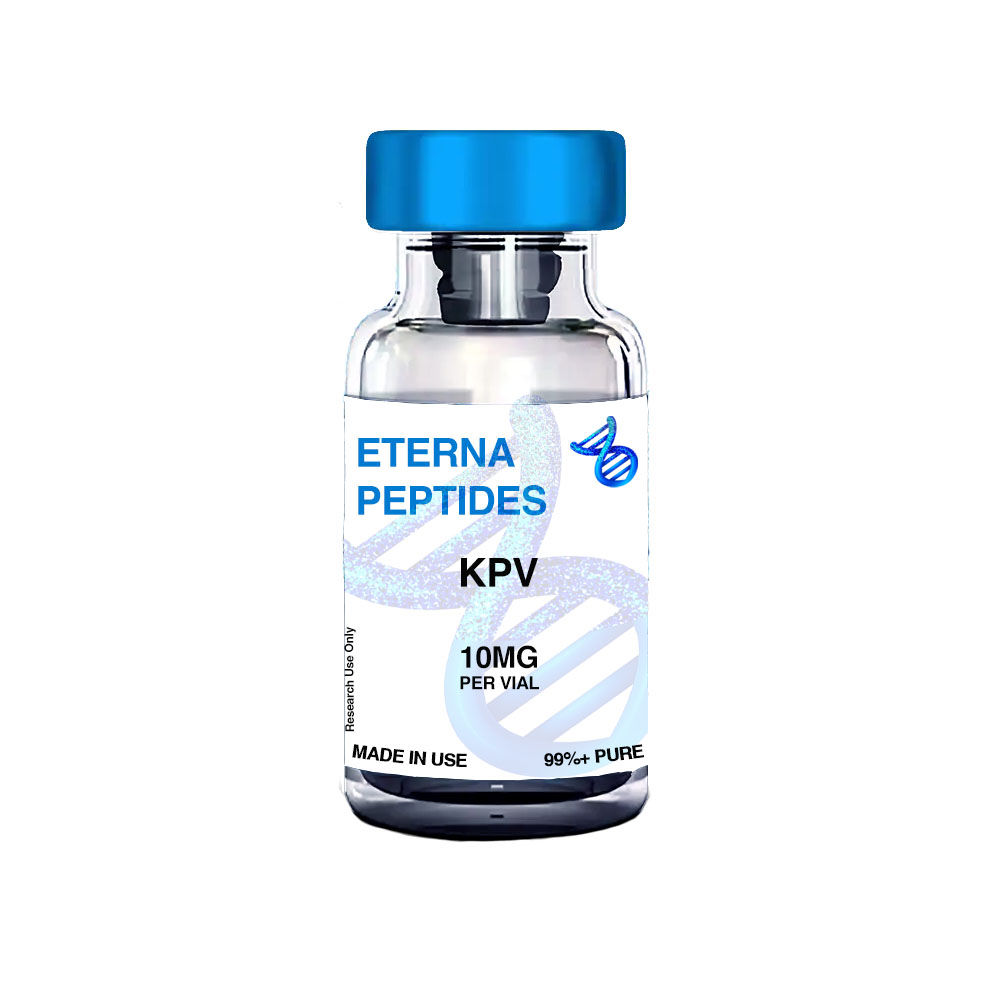KPV 10MG
α‑MSH‑derived tripeptide studied for anti‑inflammatory and antimicrobial actions. Potential benefits include reduced skin and gut inflammation, faster wound closure, and lower pro‑inflammatory cytokines in models. Human evidence remains sparse; dosing and durability of effect are not established.
KPV (Lys–Pro–Val) Research & Chemical Profile
Description
KPV (Lys–Pro–Val) is a naturally occurring tripeptide corresponding to the C‑terminal fragment of α‑melanocyte‑stimulating hormone (α‑MSH). In preclinical research, KPV demonstrates potent anti‑inflammatory and antimicrobial activity, with additional investigation in wound repair and gastrointestinal mucosal protection.
Chemical Structure / Identifiers
Property
Detail
Sequence (3‑letter / 1‑letter)
Lys–Pro–Val / K‑P‑V
Molecular Formula
C16H28N4O4
Molecular Weight
≈ 340.4 g/mol
CAS Number
72957‑37‑0 (registry listings may vary; verify for study use)
PubChem CID
16132388 (KPV tripeptide)
Synonyms
α‑MSH(11‑13); Lys‑Pro‑Val; KPV tripeptide
Proposed Mechanisms (Preclinical)
• Melanocortin‑linked anti‑inflammatory signaling: KPV reproduces key anti‑inflammatory effects of α‑MSH fragments, including down‑modulation of NF‑κB–dependent cytokines (e.g., TNF‑α, IL‑1β, IL‑6).
• Antimicrobial activity: inhibitory effects against Candida spp. and Staphylococcus aureus reported in vitro.
• Tissue repair support: promotes keratinocyte and fibroblast migration and can reduce scarring in animal models.Primary Research Focus
• Colitis/IBD models: attenuation of colonic inflammation and cytokine production in rodent models.
• Dermatology and wound care: accelerated closure and improved histology in cutaneous injury models.
• Infectious biology: adjunct antimicrobial activity demonstrated in vitro against fungal and bacterial strains.Safety / Limitations
• Research Use Only; not approved for therapeutic use.
• Evidence base is largely preclinical; controlled human data are limited.
• Optimal dosing, route, and long‑term safety have not been established; verify identity and purity for any laboratory work.Key Publications / References
PubChem Compound Summary – KPV (CID 16132388): https://pubchem.ncbi.nlm.nih.gov/compound/16132388
J Leukoc Biol (2005): Melanocortin tripeptide KPV reduces inflammatory responses in murine colitis. PubMed: https://pubmed.ncbi.nlm.nih.gov/15784528/
Peptides (2004): Antimicrobial effects of KPV against Candida and Staphylococcus. PubMed: https://pubmed.ncbi.nlm.nih.gov/15261303/
Wound Repair Regen (2007): KPV accelerates wound healing and reduces scar formation in vivo. PubMed: https://pubmed.ncbi.nlm.nih.gov/17537113/
Review – Anti‑inflammatory actions of α‑MSH and related fragments (context for KPV). PMC overview: https://www.ncbi.nlm.nih.gov/pmc/articles/PMC2948868/
Disclaimer: This document is provided for research informational purposes only. It does not constitute medical advice. KPV is not approved for diagnosis, treatment, or prevention of disease.

